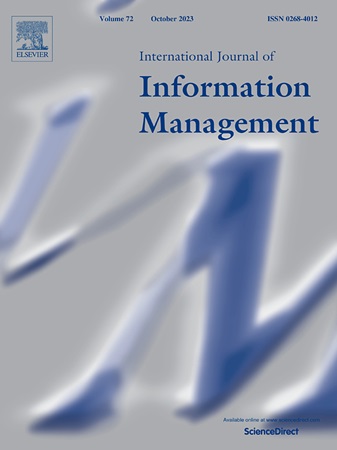科技夺走了我的力量!无力感在技术压力源与工作主动性关系中的中介作用
IF 27
1区 管理学
Q1 INFORMATION SCIENCE & LIBRARY SCIENCE
International Journal of Information Management
Pub Date : 2025-06-04
DOI:10.1016/j.ijinfomgt.2025.102930
引用次数: 0
摘要
在一个以无情的技术进步及其与工作流程的深度融合为标志的时代,技术已经发展成为一种强大的实体,在帮助人类的同时也带来了意想不到的压力。在此背景下,一个重要的问题是技术压力因素如何影响员工的权力感和工作行为。本文运用权力的趋近抑制理论和心态理论,研究了技术压力源对员工无力感和主动性的影响,并以技术成长心态为重点,探讨了这一过程中的边界条件。一项多波调查研究(N = 351)、一项实验研究(N = 248)和一项定性研究(N = 21)表明,技术压力源导致员工的无力感,而无力感反过来又减少了员工的主动行为,加剧了员工的不作为。然而,技术压力源的负面影响在拥有技术成长心态的员工中得到缓解。这些发现从权力感的角度对员工对技术压力源的行为反应(主动行为或不作为行为)提供了新的见解,并为人与技术互动的研究提供了新的见解。这些发现对那些在技术动荡中寻求提高员工积极性的组织也有实际意义。本文章由计算机程序翻译,如有差异,请以英文原文为准。
Technology takes away my power! The mediating role of powerlessness in the relationship between technostressors and proactivity at work
In an era marked by relentless technological advancement and its deep integration into workplace processes, technology has evolved into a powerful entity that aids humankind while also bringing unexpected stress. An important question in this context is how technostressors impact employees’ sense of power and work behavior. Drawing on the approach–inhibition theory of power and mindset theory, this article investigates the impacts of technostressors on employees’ sense of powerlessness and proactivity and explores a boundary condition in this process by focusing on techno growth mindset regarding technology. A multi-wave survey study (N = 351), an experimental study (N = 248), and a qualitive study (N = 21) revealed that technostressors led to sense of powerlessness which, in turn, diminished proactive behavior and aggravated inaction among the employees. However, the negative impacts of technostressors were mitigated among the employees who possessed techno growth mindset. These findings provide new insights into employees’ behavioral responses (proactive behavior or inaction) to technostressors from the perspective of the sense of power and add to the research on human–technology interaction. The findings also have practical implications for organizations seeking to bolster employees’ proactivity amidst technological tumult.
求助全文
通过发布文献求助,成功后即可免费获取论文全文。
去求助
来源期刊

International Journal of Information Management
INFORMATION SCIENCE & LIBRARY SCIENCE-
CiteScore
53.10
自引率
6.20%
发文量
111
审稿时长
24 days
期刊介绍:
The International Journal of Information Management (IJIM) is a distinguished, international, and peer-reviewed journal dedicated to providing its readers with top-notch analysis and discussions within the evolving field of information management. Key features of the journal include:
Comprehensive Coverage:
IJIM keeps readers informed with major papers, reports, and reviews.
Topical Relevance:
The journal remains current and relevant through Viewpoint articles and regular features like Research Notes, Case Studies, and a Reviews section, ensuring readers are updated on contemporary issues.
Focus on Quality:
IJIM prioritizes high-quality papers that address contemporary issues in information management.
 求助内容:
求助内容: 应助结果提醒方式:
应助结果提醒方式:


